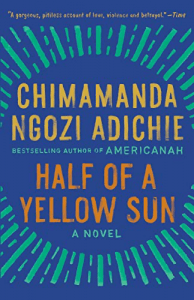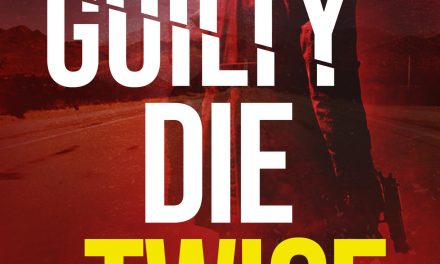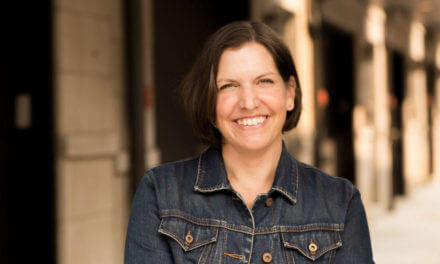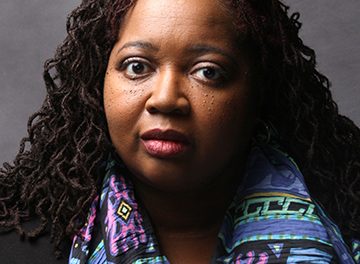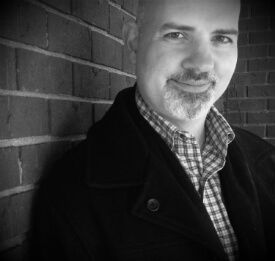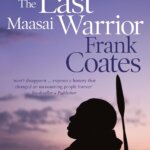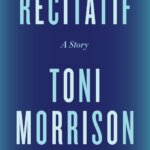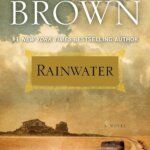
SS: What was an early experience where you learned that language had power?
MC: I wrote a play many years ago, and it was so rewarding sitting in the theater and hearing people laughing at lines I had written (lines that were, fortunately, supposed to be funny). Having an impact on a large room of people like that made a big impression on me.
SS: What writer would you be most thrilled to hear wants to meet you?
MC: I’m a big fan of Chimamanda Ngozi Adichie. I not only love her writing, but I think she is such an interesting and sharp individual.
SS: I’d like for Khaled Hosseini and Daniel Silva to read my latest. Like your Contempt, Hunting the Devil is a vigilante justice novel. If you time-warped fifty years into the future and found that something you created has become a trope or buzzword, how would you feel? Would you feel cheated of royalties or vindicated as a genius?
MC: I would just feel so happy that my work outlasted me (isn’t that many writers’ hope?). I can’t imagine a scenario where I’ll ever think that I’m a genius.
SS: What is a fun or strange source of inspiration that ended up in your book (a name, location, line of dialogue, etc.)?
MC: I named the prison in my novel after a best friend of mine. I’m not sure if she considers it a compliment or not, but the name really seemed like it fit.
SS: How do you give back to the writing community?
MC: I’m currently offering a free virtual screenwriting course to an organization that has members in three different cities. I enjoy being able to share my experiences and my knowledge of writing to others who are just starting out, especially to those who I can tell have a true passion for writing.
SS: What works best for you: typewriters, computer, dictation, fountain pen, or longhand?
MC: I use the computer for my initial planning and for the typing of the various drafts. Once my fingers are on the keyboard, it fires me up. I then print out my drafts and make my edits and notes by hand with a red or purple ink pen. Not sure what would happen if I tried using blue ink. I find it easier making changes when I read it like I’m reading an actual book (including sitting in my reading chair), rather than reading it on my computer monitor.
SS: A good ending should fix the shape and meaning of the whole novel. How did you make sure yours did exactly that?
MC: My novel is a murder mystery, and so more than anything I want the ending to be a surprise, but I also want it to make sense. Sometimes I think writers put twists at the end just to say “gotcha”, but the twist doesn’t always ring true. What I especially want is for people to reread my novel and pick up on dialogue or actions that they interpreted one way during their initial read and then see it in a totally different light during the second read (and perhaps think to themselves, “ah, I totally missed that.”)
SS: Are you looking to entertain or illuminate?
MC: My primary goal is to entertain. After that, I’d love it if I made people think about the question at hand. I’m not necessarily trying to ‘illuminate’ in the sense that I’m trying to help people see ‘the answer’, but I’d love to give them something to ponder and have them figure out what they think about a certain issue.
SS: Have any new writers grasped your interest recently?
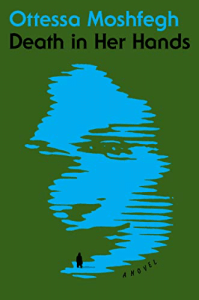
SS: She’s on my To-Be-Read list. What is your most recent book? In twenty-five words or less, tell me why your book should be a reader should start your book next.
MC: My book is a legal thriller about an innocent man who was released after spending five years death row for a crime he didn’t commit. A reader should start my book because it shows how a good person can change after they’ve been the victim of a travesty of justice. (And because I said “please”?)
SS: Who is the protagonist in your most recent work? Describe him/her in ten words or less.
MC: A lawyer released from death row on a technicality.
SS: What advice would you give aspiring writers?
MC: I think so much of success in any type of writing comes down to persistence. I have had a small bit of success in Hollywood and now in publishing because I kept working at it, whereas the majority of writers quit after one try (if they even get that far). I will simply outlast a lot of other writers.
SS: Is there a phrase or quote about writing you particularly like or that inspires you?
MC: “It’s the writing that teaches us”. In other words, the best way to get better is to keep writing. Also, remember that your first draft is very likely going to be awful. That’s why it’s just the first draft. Don’t judge while writing your first draft.
SS: Is one of the points of thrillers to suggest that we might all be capable of more than we care to admit?
MC: It’s funny you ask this. I have a line in my novel where one character actually says “It is my solemn belief that anybody is capable of doing anything at any time.” One of the main questions of my novel is how a good person may change after having been wronged so terribly. Will they continue to have the same goodness they used to have, or have they changed in a way that they can’t get back to where they were before? This is the question my protagonist wrestles with during the novel.
SS: Must you lay empathy and pity to one side to write thrillers effectively?
MC: I feel you should always have empathy for your characters, even your antagonists (unless, perhaps, they are just truly heinous as can be found in “slasher” murder books, but that’s not the sort of thing I write)
SS: Do you prefer tidy endings, or can you leave a few loose ends?
MC: I prefer endings where everything that has led up to it makes sense and answers the main question at hand, but while you’re perhaps left with a hopeful optimism that the protagonist is going to be okay, you’re not certain.
SS: The Staunch book award has recently been launched to honor thrillers in whose plots ‘no woman is beaten, stalked, sexually exploited, raped, or murdered’ How do you react to the assertion that violence against women in fiction has reached a ridiculous high? How do you make crime fiction entertaining without adding to the problem?
MC: That’s an interesting, and tough, question. I feel that the gratuitous, almost stylized violence against women has gotten way out of control. It’s as though it’s being glamourized, and that’s not something I want to read. But I also don’t know that a goal should be to avoid showing it altogether, if it puts a spotlight on a problem that takes place every day. That’s not a criticism of the Staunch book award: I think that’s a great thing. I just think that one role of literature can also be to not let people put their head in the sand when it comes to the problem of violence against women (or other types of societal problems). Probably the main difference is how it’s portrayed; whether it’s presented in a way to reveal the problem or if it’s done in a gratuitous way.
SS: Describe your books in 3 words:
MC: There is hope.
SS: Pantser or Plotter?
MC: Definitely a plotter. I know most everything that is going to happen in my story and where it happens before I start writing. I can surprise myself with significant story twists I wasn’t expecting, but that usually comes in the planning stage. Before I take a long road trip, I know which route I’m taking and where I’m going to spend the night, etc. Same thing with my writing.
********************
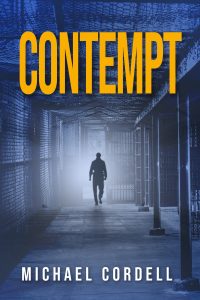
********************
An excerpt from Contempt:
Five years had passed since the two lawyers last faced each other in a court of law. Five years—or a lifetime, depending on which lawyer you asked.
Thane Banning was struck by how cavernous the L.A. courtroom felt with only four people present. At the original trial, a crush of spectators had overwhelmed the space; each morning when the building opened, the mob would scramble forward, fighting their way inside as if it were a lifeboat on the side of a sinking ship.
But today, Thane’s voice echoed off the marble walls.
Five years ago, the press had laid siege not only to the courtroom and the adjacent hallway, but also to the front steps of the courthouse and down each sidewalk. TV news vans parked bumper-to-bumper for five blocks. It had been dubbed the trial of the year, the decade, and even the century, depending on which cable news pundit was talking. But today there were no members of the press, no microphones, no cameras, no news vans puttering outside. Judge Bennett Williams was conducting today’s hearing as surreptitiously as possible.
Judge Williams, who had served on the bench for thirty-eight years, hadn’t presided over the original trial, but it was his unfortunate lot to draw today’s arguments. The uniformed guard posted next to the locked door was also absent last time, but his presence today wasn’t just for show. Today his leather holster was unsnapped, providing easy access to his service revolver.
Of the four men in the courtroom, only the two lawyers were back in their original places. Bradford Stone once again assumed charge of the prosecution, although this time he did so as the District Attorney for Los Angeles. At forty-seven, Stone’s features, like his designer suits, were a collection of sharp angles. Thane figured the courtroom artists would have to fish for their finest-tipped pencils to draw his face. His dark eyes were those of a hawk on a wire, surveying the landscape, scanning for prey.
Thane once again stood at the defense table across the aisle from Stone. The DA hadn’t changed over the years, but Thane knew the same couldn’t be said for himself. Instead of an Armani suit, today’s thread-worn jacket was three sizes too small, too tight to fasten the buttons. His black hair was as thick as ever, but he had seen tendrils of white worming their way to the surface over the past few months—not a distinguished gray like the judge’s, but white, the kind of shock-white most men would dye away.
He was only thirty-six years old.
But it was on the inside that Thane had changed the most. There had been a time when he might have felt overwhelmed by what was happening to him, but today he felt nothing but contempt.
This post contains Amazon Affiliate links.

